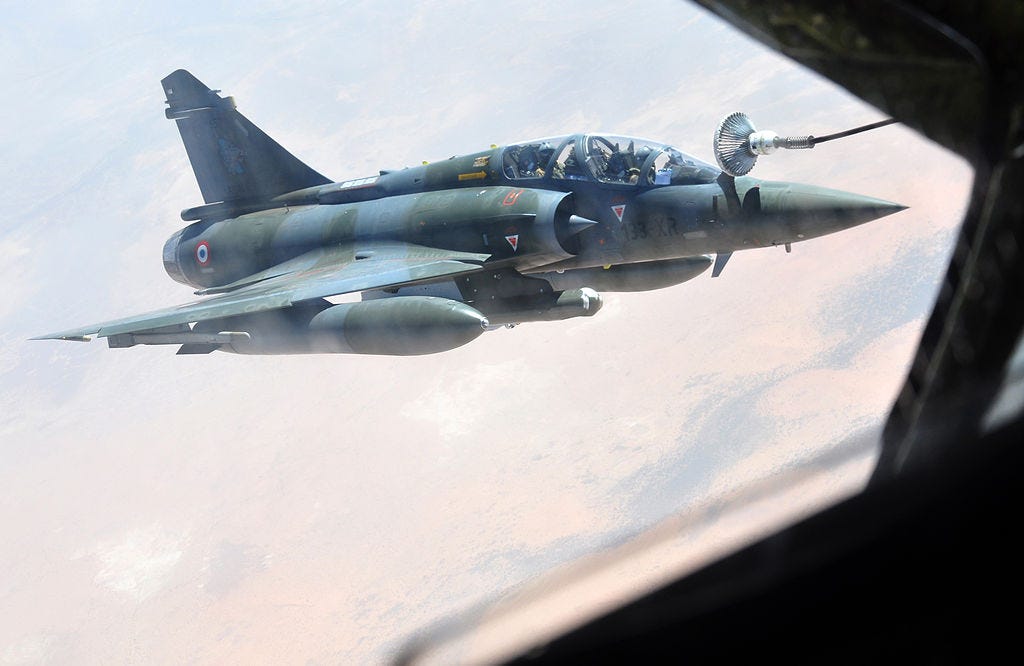The French military is in the process of changing how if fights in Africa. France now wants to focus more on fighting terrorism rather than traditional peacekeeping missions.
France is sending some 3,000 soldiers to the region on a “long-term” basis. French minister of Defence Jean-Yves Le Drian announced the changes after meeting with Ivorian President Alassane Ouattara.
However, the Ministère de la Défense is really just reshuffling troops already on the continent. The country has no plans to dramatically increase the total number of troops deployed and the African nations hosting them have already agreed to the new plans.
Paris is worried about Al Qaeda in the Islamic Maghreb and other militant and criminal groups in the Sahel—the semi-desert region separating North Africa from the sub-Saharan portion of the continent. Terrorists could possibly launch strikes in Europe from these historically “ungoverned spaces.”
French and U.S. soldiers training together. U.S. Marine Corps photo
The reorganization in Africa is specifically designed to handle this new threat scenario. And France is settling in for the long-haul if Le Drian’s comments are any indication.
Starting in 2015, French soldiers in Côte d’Ivoire will concentrate on providing logistical support and act as a reserve to other French forces in the region. The base in the country’s capital Abidjan already played this role in 2012 when France intervened in Mali.
A substantial force will also remain in Mali. However, the 1,000 man “frontline division” is another step down from 1,400 soldiers currently there and is much smaller than France’s initial 5,000-strong force.
Some of the troops leaving that West African nation are relocating to Chad. The Central African nation is set to host more than 1,200 French personnel.
France plans to establish a headquarters for African operations in the country’s capital Ndjamena. French Rafale and Mirage fighter jets are also based there along with aerial tankers.
Paris is also sending smaller detachments to other countries. More Reaper and Harfang surveillance drones are going to Niger and and French special forces are setting up shop in Burkina Faso.
These changes represent a fundamental shift in French political priorities in western Africa. For decades, France continued to call the shots in former colonies after they became independent.
Also, France concentrated mainly on peacekeeping and stabilization missions in individual countries before Tuareg rebels and Islamist terrorists took over northern Mali. The former colonial power often used its considerable economic and military power to prop up and topple local governments virtually at will.
French policy takes a sharp turn
Operation Licorne is a prime example. France started the mission in Ivory Coast in 2002 to support the United Nations Operation in Côte d’Ivoire. French forces then played an instrumental role in determining the outcome of the last election.
In 2010, incumbent president Laurent Gbagbo refused to accept defeat and set off a revolt. French helicopter gunships helped rebel forces take control of the capital and detain the former leader.
In the past, Paris also used its forces in Chad to support or remove a succession of governments. The country is still strategically important to French interests in the region.
But the French have steadily lost interest in controlling their former colonial possessions in recent years. Le Drian reckons that Licorne is no longer necessary in its current form.
This development is interesting on its own. Ivory Coast is scheduled to have a presidential elections next year. Paris must believe that Ivorian president Ouattara and his supporters are firmly in charge.
This new role is certainly more productive than playing kingmaker. But counter-terrorism has its own potential pitfalls.
The Grande Nation is betting heavily on a military solution. However, fighting extremists requires strong cooperation with local governments and their militaries.
In fact, authoritarian tendencies and mismanagement are root causes of insurgencies. Corruption and ineptitude in countries like Nigeria and Mali also provokes military coups and mutinies.
France will have to find a delicate balance to secure its long-term objectives. Sustainable political reform and economic development in the region may turn out to be just as important as actively fighting terrorists.


No comments:
Post a Comment